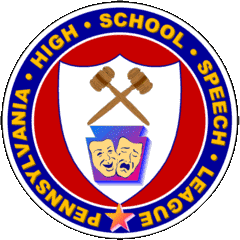
The Pennsylvania High School Speech League (PHSSL) is a high school forensics league within the state of Pennsylvania. The PHSSL state championship takes place yearly in March at Bloomsburg University.

The Pennsylvania High School Speech League (PHSSL) is a high school forensics league within the state of Pennsylvania. The PHSSL state championship takes place yearly in March at Bloomsburg University.
PHSSL was founded in 1961, by Dr. Robert E. Dunham, to promote speaking throughout the entire state of Pennsylvania at Penn State University. The state championship took place at Susquehanna University from 1992 through 2016, and since 2017, the state championship takes place at Bloomsburg University.
The Pennsylvania High School Speech League publishes its own newsletter which is titled "The Communicator". PHSSL uses "The Communicator" to put forth information regarding leadership in the organization, plans, and records of student performance in the state championship.
The Pennsylvania High School Speech League chooses the officers in the organization based on their merit and dedication to promoting forensics. The election of officers is a democratic process. As of June 2023, the current leaders include:
PHSSL has created a hall of fame for great participants, coaches, and supporters of forensics. The Pennsylvania High School Speech League's hall of fame came into existence in 1986, and has inducted at least one member ever since.
PHSSL features many events at the state tournament. To qualify, there is a bidding system where excellent performance at local tournaments can earn a student a bid. If a student receives three or more bids, then they automatically qualify. Alternatively, there are also district tournament qualifiers where students can qualify for the state tournament directly. A list of events from the PHSSL Website:
Drama: Competition in drama is held at the regional and state levels. A school performs a one-act play or cutting of a longer work with more than two characters. Two schools advance from each region to the state finals. Competitions are held during the first semester.
Policy Debate: A clash of two, two-person teams, one affirmative and one negative, on the annual national policy resolution. The affirmative presents a case for change in the present system. The negative supports the present system or a counter-proposal for change.
Public Forum Debate: A clash of two 2-person teams, one pro and one con on a contemporary resolution. National topics change every month.
Lincoln-Douglas Debate: A clash of two debaters, one affirmative and one negative, on a values topic.
Parliamentary Debate: A clash of two 3-person teams, one for the resolution and one against the resolution. Rounds can be either on a prepared topic or an impromptu topic chosen 30 minutes before the start of the round. Topics are chosen by the Executive Board for the District and State Tournaments.
Oral Interpretation of Poetry: A contestant interprets with script in hand one or more poems. Time limit: 10 minutes.
Oral Interpretation of Prose: A contestant interprets with script in hand a cutting from a short story or novel. Time limit: 10 minutes.
Dramatic Interpretation: A contestant chooses a cutting from a serious play and memorizes it. The student recreates the scene using appropriate gestures and voices. Time limit: 10 minutes.
Humorous Interpretation: A contestant chooses a cutting from a humorous play and memorizes it. The student recreates the scene using appropriate gestures and voices. Time limit: 10 minutes.
Informative Speaking: Original speeches teach or explain a concept or idea. Time limit: 7 minutes.
Extemporaneous Speaking: A contestant is provided three current events topic on politics, economics, or culture to choose from and selects one. Preparation time: 30 minutes. Time limit: 7 minutes.
Persuasive Speaking: Original speeches convince the audience. Time limit: 10 minutes.
Extemporaneous Commentary: A continuation of both extemporaneous and persuasive speaking. It can be both informative and advocative. Knowledge of events and some history is required. Contestants seated at a table or desk for the presentation. Preparation time: 30 minutes. Time limit: 7 minutes.
Duo Interpretation of Literature: “Literature” is defined as a single stage, screen, television, radio play, fictional or non-fictional work or poem. All selections must be published or commercially available in print, audio, or video form. Time limit: 10 minutes.
Impromptu Speaking: In a limited amount of time a student prepares a brief speech on topics such as proverbs, aphorisms or quotations. Preparation time: 5 minutes. Time limit: 5 minutes.
Student Congress (Senate): In this event students take on the roles of legislators. Using parliamentary procedure, students debate bills and resolutions on current issues.
In addition, competition in the following events are held at the state level only:
News Broadcasting: A pair of contestants present a two-minute news broadcast. In subsequent rounds, prepared scripts are used.
Student Congress (House): The event is the same as Senate, however different legislation is used, and each school is limited to only one entry for House.